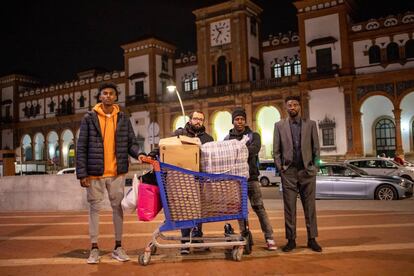Meet the migrants helping the homeless in the south of Spain
Once a week, a collective of around 30 foreigners distributes clothes and blankets to people sleeping rough in Jerez de la Frontera in Cádiz province


Ilyas El Masdouri knows what it feels like to be cold. It’s the feeling he had when, as a Moroccan minor, he tucked himself under a truck whose wheels “could have squashed my head” at the port of Ceuta, Spain’s North African exclave city, in a bid to reach the Spanish mainland. It’s what he felt in his bones along with fear when he slept among cardboard boxes in Barcelona; and it’s the same feeling that stops the homeless in Jerez de la Frontera in the southern province of Cádiz from getting a proper night’s rest on a damp December night. “I was like that, on the ground, and now I’m the one helping,” says the 19-year-old from Tetouan as he pushes a trolley filled with blankets and clothes to be handed out.
We need help, but we also like to help
Bubaca Biaro, a 29-year-old from Guinea
It’s only been days since El Masdouri has himself found a home with a local woman from Jerez de la Frontera but that has not stopped him from joining the ranks of migrants who decided last month to go out and help those with less than themselves. They belong to the Dimbali Jerez Immigrant Support Network, a collective of 30 people made up of foreigners and Spaniards who first started operating in 2018 during the migration crisis in the province. Since then, the organization has even managed to set up an indoor soccer team of young African men.
Abdullah Abass distributes the blankets and clothes after he’s finished soccer training. He is scarcely 18 with an easy smile but just a year back he was one of the Somali minors rescued by the Open Arms rescue ship off the coast of Libya and brought to shore in San Roque. Accompanying him is Bubaca Biaro, a stylish 29-year-old Guinean who does a good imitation of the flamenco singer Camerón. “We need help, but we also like to help,” he says, explaining the motivation behind their initiative. “I am healthy and that’s about all I have, but I don’t like to see people sleeping on the street.”
This is exactly the thinking activist Iván Caro has nurtured in Dimbali with the slogan,“Cold hurts, but indifference kills.” “It is mutual support,” says Caro who also organizes the soccer team. “One day I’m having it bad, another day, you need help.”
When Juan Carlos, a 48-year-old from Jerez, comes across the Dimbali crew with their trolley on a cold Wednesday night in December, he tells them he is hungry and asks for a coat, a sweater and socks. “I have been sleeping rough for three months,” he says, before moving off with a number of old domestic appliances in tow. “I get by anyway I can.”
It’s strange when they say, ‘Look! A black guy is coming to help us’
Bubaca Biaro, a 29-year-old from Guinea
Afterwards, the team finds an old man lying huddled outside a building. He is barely able to speak. They cover him with blankets. Further along, there’s a German man, familiar to them, who sleeps in the door of a bank.
“It’s strange when they say, ‘Look! A black guy is coming to help us,’” says Biaro, who like Abass, lives in a shared flat while his asylum application is processed. The same goes for Mohamed Samba, a 22 year old from Guinea who hopes to build a future in Spain as a tailor. They have all had complicated pasts that are hard to speak about. Biaro talks about losing a friend and how he spent “two days adrift” in the Strait of Gibraltar before the Civil Guard picked him up. Meanwhile, Abass will never forget the year he spent in Libya, held in a room by force until a call to his mother got him a passage on a boat in the central Mediterranean.
Waking up afraid
As he hands out the blankets, Ilyas El Masdouri touches upon his experience under a truck. “You have to move quickly and find a space,” he says, before going on to explain how he felt when he himself was sleeping rough. “You look for some cardboard and somewhere to sleep but if anyone came near me, I woke up terrified in case they were going to do something to me.”
He now has temporary accommodation with a Dimbali volunteer, but El Masdouri still mourns the loss of an older brother who drowned crossing the Strait of Gibraltar. And despite the fact that his life is far from easy, he has four younger brothers who are determined to embark on the same odyssey. “Nobody can get them to put coming to Spain out of their heads,” he says.
Initially, Abass had no intention of ending up in the south of Spain. But after spending time in the center for minors in Algeciras and receiving help in Seville, he is now happy in Jerez. “The only thing I want is to be able to work in whatever I can to help my family,” he says.
This is his first Christmas in Europe and he stares with wonder at the excess of decorations and lights. At one point, he passes a life-sized nativity scene and asks, “Who is that family with all those people around them?”
English version by Heather Galloway.
Tu suscripción se está usando en otro dispositivo
¿Quieres añadir otro usuario a tu suscripción?
Si continúas leyendo en este dispositivo, no se podrá leer en el otro.
FlechaTu suscripción se está usando en otro dispositivo y solo puedes acceder a EL PAÍS desde un dispositivo a la vez.
Si quieres compartir tu cuenta, cambia tu suscripción a la modalidad Premium, así podrás añadir otro usuario. Cada uno accederá con su propia cuenta de email, lo que os permitirá personalizar vuestra experiencia en EL PAÍS.
¿Tienes una suscripción de empresa? Accede aquí para contratar más cuentas.
En el caso de no saber quién está usando tu cuenta, te recomendamos cambiar tu contraseña aquí.
Si decides continuar compartiendo tu cuenta, este mensaje se mostrará en tu dispositivo y en el de la otra persona que está usando tu cuenta de forma indefinida, afectando a tu experiencia de lectura. Puedes consultar aquí los términos y condiciones de la suscripción digital.








































